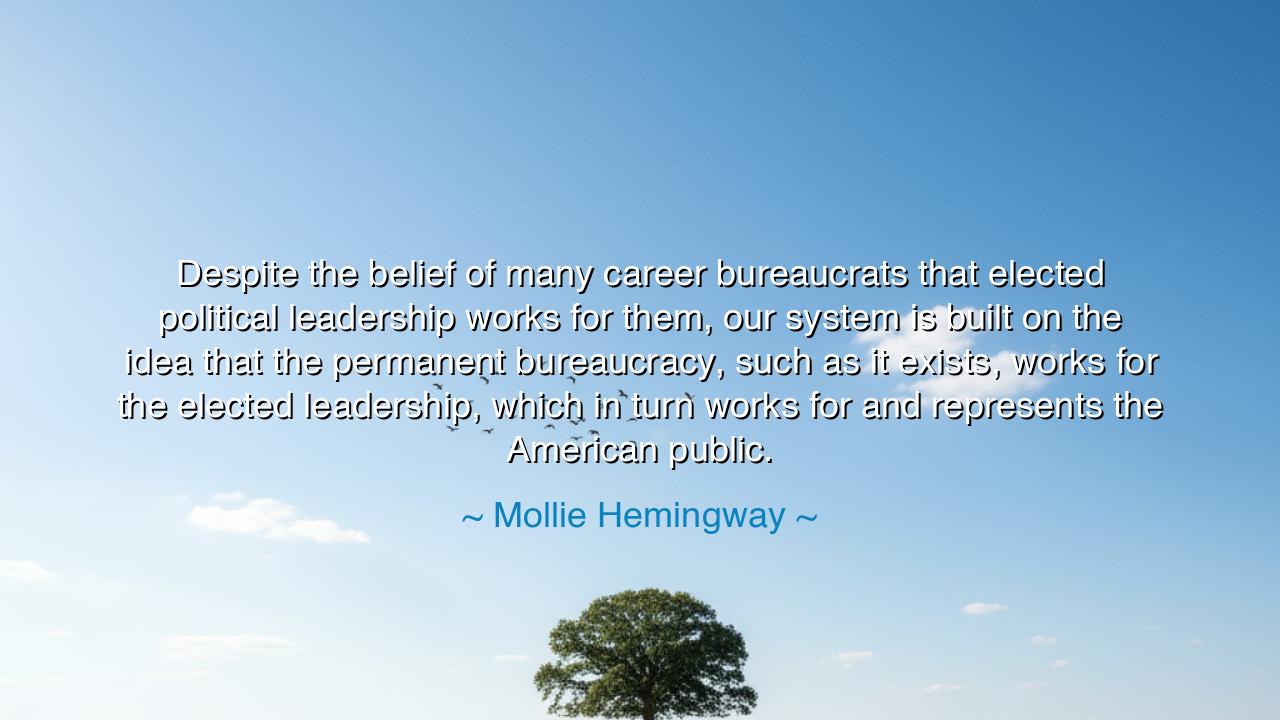
Despite the belief of many career bureaucrats that elected
Despite the belief of many career bureaucrats that elected political leadership works for them, our system is built on the idea that the permanent bureaucracy, such as it exists, works for the elected leadership, which in turn works for and represents the American public.






In the words of Mollie Hemingway: “Despite the belief of many career bureaucrats that elected political leadership works for them, our system is built on the idea that the permanent bureaucracy, such as it exists, works for the elected leadership, which in turn works for and represents the American public.” These words cut to the heart of the relationship between power and responsibility, between rulers and the ruled, between the visible leaders and the unseen structures that carry out their commands. It is a reminder that in a republic, the order of authority must always flow back to the people, who are the true sovereigns.
The ancients, too, warned of this balance. In Rome, the Senate and magistrates commanded great respect, but the principle of the Republic was that all power flowed from the people. When the permanent servants of the state—scribes, treasurers, and generals—forgot this, corruption spread, and Rome shifted from a republic of citizens into an empire of rulers. Hemingway’s words echo this ancient lesson: when bureaucrats imagine themselves the masters instead of the servants, liberty begins to fade.
History shows us the consequences of this forgetting. In the courts of France before the Revolution, the royal bureaucracy had become swollen and arrogant, convinced that the monarch and his ministers existed to sustain them. Tax collectors drained the people while clerks and administrators thrived in luxury. The leadership ceased to represent the nation, and instead served the machinery of power. The result was inevitable: the fury of the people swept away both king and office alike. This tale warns us that when the chain of service is broken, when rulers or servants forget their role, chaos and ruin soon follow.
Yet there are also noble examples. In the United States after its founding, George Washington set the precedent of humility in office. Though surrounded by advisors and early structures of government, he reminded his officers that their allegiance was not to him as a man, nor to their own ambitions, but to the public. Washington himself refused kingship, laying down power after two terms to remind all that leaders are but servants of the republic. Here lies the spirit Hemingway defends: a leadership accountable to the people, not enslaved to a hidden bureaucracy.
The quote also reminds us of a deeper truth: that leadership itself is a sacred trust. It is not meant for personal glory, nor for endless preservation of position, but for representation of the common good. The permanent structures of government—offices, laws, agencies—are but tools. Without rightful direction, they become machines that grind down the very people they were meant to serve. But when ordered rightly, they preserve liberty, enforce justice, and safeguard peace.
The lesson is clear: citizens must never forget their role as the final arbiters of power. Leaders must be reminded that they represent, not rule, the people. Bureaucrats must be reminded that their work is service, not dominion. And the public must remain vigilant, lest the flow of authority be reversed and the servants become the masters. For democracy and republics endure not by accident, but by constant attention to this sacred order.
Therefore, O listener, take this wisdom into your heart: demand accountability, cherish your role as a citizen, and honor those who lead with humility. Remember that the greatest nations are not built on the pride of rulers nor the comfort of officials, but on the steady truth that all leadership is service, and all service must return to the people. Guard this chain, for in it lies the lifeblood of freedom.






AAdministratorAdministrator
Welcome, honored guests. Please leave a comment, we will respond soon